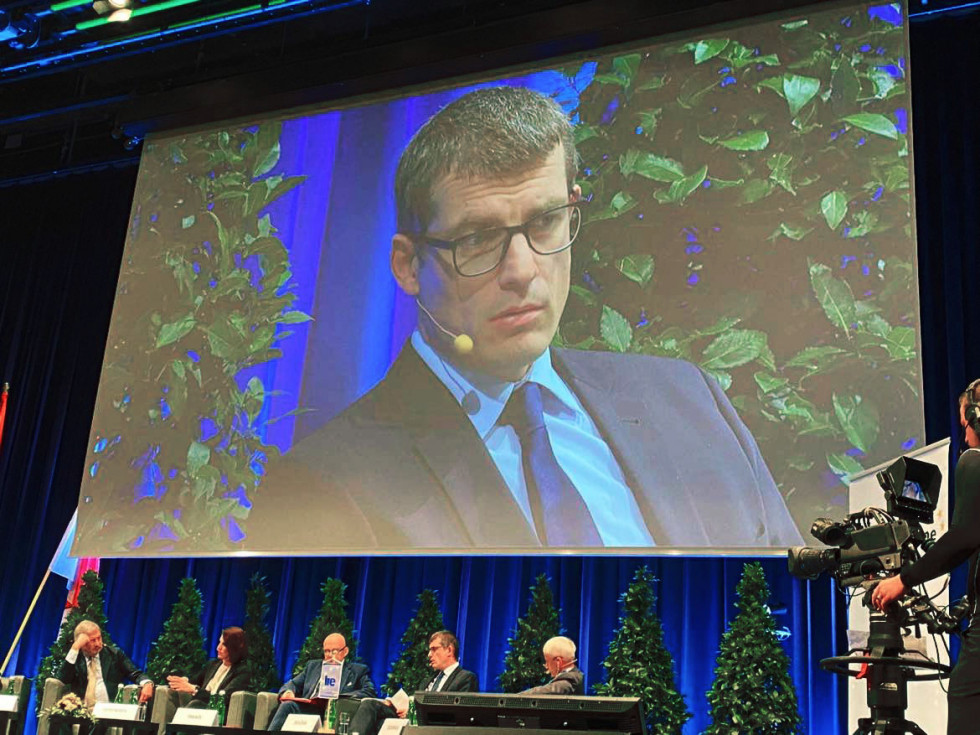State Secretary Dovžan attends the opening of the 17th Salzburg Europe Summit
- Ministry of Foreign Affairs

State Secretary Gašper Dovžan at the opening of the 17th Salzburg Europe Summit | Author Ministrstvo za zunanje zadeve
The discussion focused on the impact the COVID-19 crisis had on democratic processes at a time when governments around the world were taking measures that interfered with the human rights previously taken for granted. Countries around the world were forced to take measures in an effort to tackle the global pandemic and ensure the consequent protection of human lives and health. The debate underlined the need to strike a balance to guarantee fundamental rights and freedoms on the one hand and to safeguard public health together with the sustainability and stability of public health systems on the other.
The participants agreed that after the initial uncertainty, EU member states responded well to the crisis. The historic agreement on the recovery plan has provided momentum for the EU economy. The successful implementation of joint procurement for the development and procurement of vaccines has led to the EU today having the highest share of vaccination coverage globally, while also being the largest donor of vaccines to countries with difficulties in accessing vaccine supplies. The implementation of the Digital Green Certificate has greatly facilitated travel without creating epidemiological risks. All these achievements have been helping people to return to normal life as quickly as possible, thus enabling the gradual removal of the restrictions on individual rights and freedoms required to successfully tackle the spread of the virus.
In his speech, State Secretary Dovžan highlighted the efforts of the Slovenian Presidency of the Council of the EU to build a Health Union that will also be better prepared to cope with epidemics in the future. Although health does not fall within the competence of the EU, mutual coordination of measures is practically imperative due to their impact on several common EU policies. Slovenia is also striving to draft conclusions that would serve as a basis for drawing up action plans to prevent such high number of restrictions in the event of new crises in the internal market. Such restrictions are not only an encroachment on the rights of individuals, but also paralyse economic dynamism and weaken the social status of citizens.
The debate also brought to the fore the importance of strong political leadership in times of crisis, especially in the context of efforts to increase population vaccination coverage. Vaccination is not only an individual choice but also a question of solidarity and safer coexistence. The participants agreed that, from the point of view of the protection of public health, it is acceptable for vaccinated persons to benefit from a wider range of rights and freedoms than those who choose to be unvaccinated. They also pointed to the direct damage caused by fake news related to the effects of vaccines. They underlined that vaccines are an essential safe choice for citizens.
In the light of efforts to return to normal life as soon as possible, State Secretary Dovžan stressed the responsibility not only of the profession and of individual governments but also of the political opposition and the legislative and judicial branches of power. Irresponsible behaviour and inconsistent messages can quickly undermine efforts to comply with measures and behavioural patterns that reduce the risk of infection.
On the margins of the conference, the State Secretary met with the Austrian Federal Minister for the EU and Constitution at the Federal Chancellery, Karoline Edtstadler, and the Serbian Minister of European Integration, Jadranka Joksimović.

